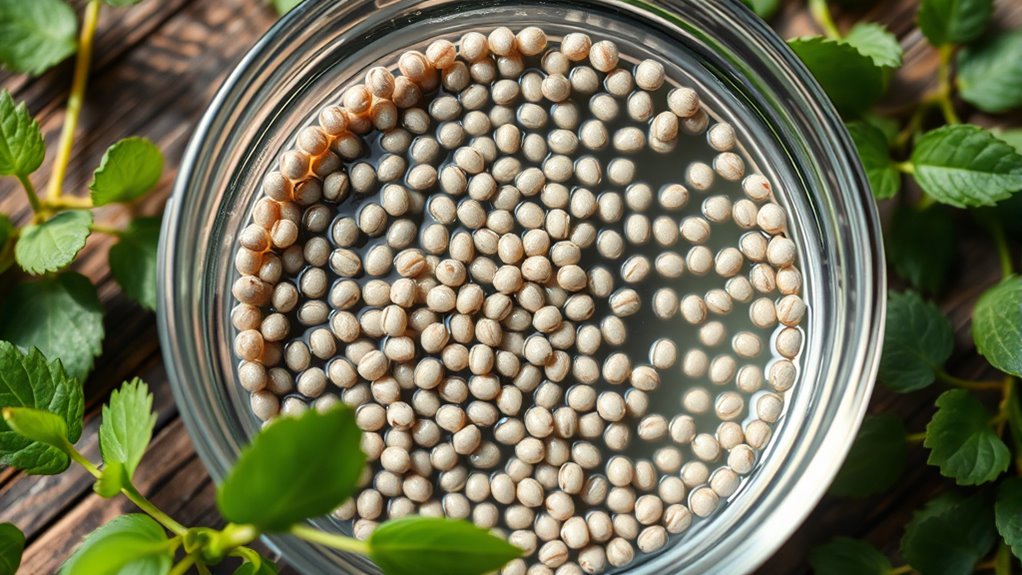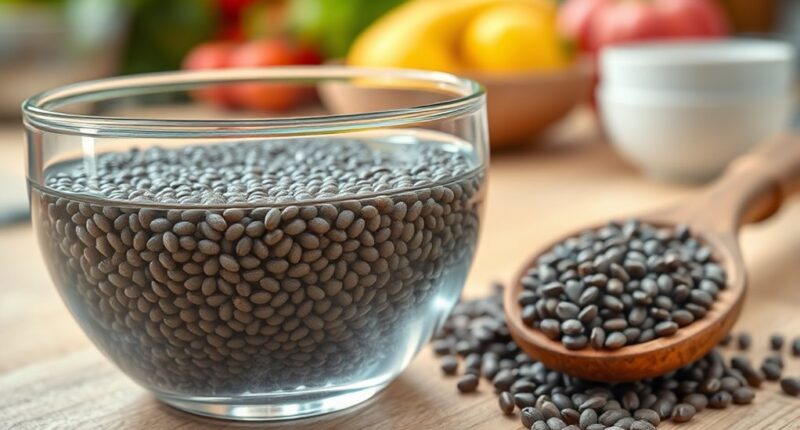Chia seeds can help ease IBS symptoms by providing soluble fiber that promotes healthy digestion and regular bowel movements. They act as a prebiotic, supporting beneficial gut bacteria and reducing inflammation, which may soothe discomfort. However, you should introduce them gradually and soak them before eating to prevent bloating or gas. Pay attention to your body’s response and adjust intake carefully. To discover more effective ways to manage IBS, continue exploring this topic.
Key Takeaways
- Chia seeds’ high soluble fiber can promote regular bowel movements and soothe the gut, potentially easing IBS symptoms.
- As prebiotics, chia seeds support beneficial gut bacteria, which may improve microbiome balance in IBS.
- Soaking chia seeds reduces choking risk and enhances digestibility, making them safer for IBS sufferers.
- Gradually increasing chia seed intake and drinking plenty of water help prevent bloating and gas.
- Individual responses vary; careful monitoring is essential to determine if chia seeds alleviate or worsen IBS symptoms.

Have you ever wondered if chia seeds can help or hinder your IBS symptoms? The answer largely depends on how they affect your gut health and how much fiber content you consume. Chia seeds are renowned for their high fiber content, which can be a double-edged sword for people with IBS. On one hand, fiber is essential for maintaining a healthy digestive system, promoting regular bowel movements, and supporting gut bacteria. On the other hand, too much fiber—especially soluble fiber—can sometimes cause bloating, gas, or discomfort if your gut isn’t used to it.
Because chia seeds are packed with soluble fiber, they can absorb water and form a gel-like substance in your digestive tract. This gel can help regulate bowel movements, which is beneficial if you struggle with constipation. It can also soothe the lining of your gut, potentially reducing inflammation and improving overall gut health. However, if you’re sensitive to fiber or tend to experience bloating and gas, introducing chia seeds gradually is key. Starting with small amounts allows your gut to adjust to the increased fiber intake without overwhelming it. It’s also important to soak the seeds before eating them, as this makes them easier to digest and reduces the risk of choking or discomfort.
Introducing chia seeds gradually and soaking them can help soothe your gut and prevent discomfort.
In terms of gut health, chia seeds can be a valuable addition to your diet if consumed thoughtfully. The fiber they provide acts as a prebiotic, serving as food for beneficial gut bacteria. A healthy microbiome is vital for managing IBS symptoms, as it helps regulate inflammation and supports digestion. Including chia seeds in your meals—such as smoothies, yogurt, or oatmeal—can boost your fiber intake naturally. Just remember, moderation is essential. Too much fiber too quickly can backfire, leading to increased bloating and discomfort, which might worsen your IBS symptoms rather than improve them.
Monitoring your body’s response is essential. If you notice increased gas, bloating, or pain after adding chia seeds, cut back and reintroduce them more slowly. Drinking plenty of water alongside chia seeds also helps prevent constipation and ensures that the fiber functions effectively. Being aware of fiber sensitivities and adjusting your intake accordingly can help you maximize the benefits of chia seeds without aggravating your IBS symptoms. Keep in mind that everyone’s triggers and tolerances differ, so listening to your body and adjusting your intake accordingly can help you maximize the benefits of chia seeds without aggravating your IBS symptoms. Overall, when used carefully, chia seeds can support your gut health and potentially ease some IBS-related discomforts.
Frequently Asked Questions
Are There Any Risks Associated With Eating Chia Seeds for IBS?
You might wonder about chia seed safety for IBS. While generally safe, some people experience allergy concerns or digestive issues like bloating and gas from high fiber intake. To minimize risks, start with small amounts and drink plenty of water. If you notice allergic reactions or worsening symptoms, stop consuming chia seeds and consult your healthcare provider. Being cautious helps make certain chia seeds are a beneficial addition to your diet.
How Much Chia Seed Intake Is Safe for IBS Sufferers?
Oh, so you wanna know the perfect chia seed amount for IBS? Well, irony’s on your side—portion control is key. Follow dietary guidelines and start small, like a teaspoon daily, then gradually increase if tolerated. Usually, up to one to two tablespoons per day is safe. Always listen to your body and consult your doctor, because even superfoods need moderation to avoid IBS flare-ups.
Can Chia Seeds Cause Allergic Reactions in Some Individuals?
You might wonder if chia seeds can cause allergic reactions, and the answer is yes, in some cases. People with seed sensitivities or allergies could experience symptoms like itching, swelling, or difficulty breathing after consuming chia seeds. It’s important to start with small amounts to see how your body reacts. If you notice any allergic reactions, stop eating chia seeds and consult a healthcare professional for guidance.
Do Chia Seeds Interact With Common IBS Medications?
Think of chia seeds as tiny ships steering through your digestive waters. When it comes to medication interactions, they generally don’t cause major storms, but they may influence how your digestive system responds. Chia seeds can sometimes lead to digestive side effects like bloating or gas, which might interfere with IBS medications. Always consult your healthcare provider before adding them to your routine, especially if you’re on medication, to keep your ship steady.
Are There Specific Types of Chia Seeds Better for IBS Management?
When choosing chia seeds for IBS management, you should consider seed quality and sourcing practices. Select organic, high-quality seeds that are fresh and free from contaminants. Better sourcing ensures you’re getting seeds with ideal nutrient content and fewer additives, which can help reduce irritation. Always buy from reputable suppliers who prioritize sustainable practices, so you can confidently incorporate chia seeds into your diet without worrying about potential sensitivities or contaminants.
Conclusion
So, as you navigate the labyrinth of IBS, chia seeds can be your gentle compass, guiding you through the stormy seas of discomfort. Their soluble fiber acts like a soothing balm, softening the jagged edges of your symptoms. While they aren’t a magic wand, incorporating chia seeds into your routine may turn your digestive landscape from a tumultuous storm into a calmer, clearer horizon—offering hope that even the roughest waters can find their tranquil shore.









